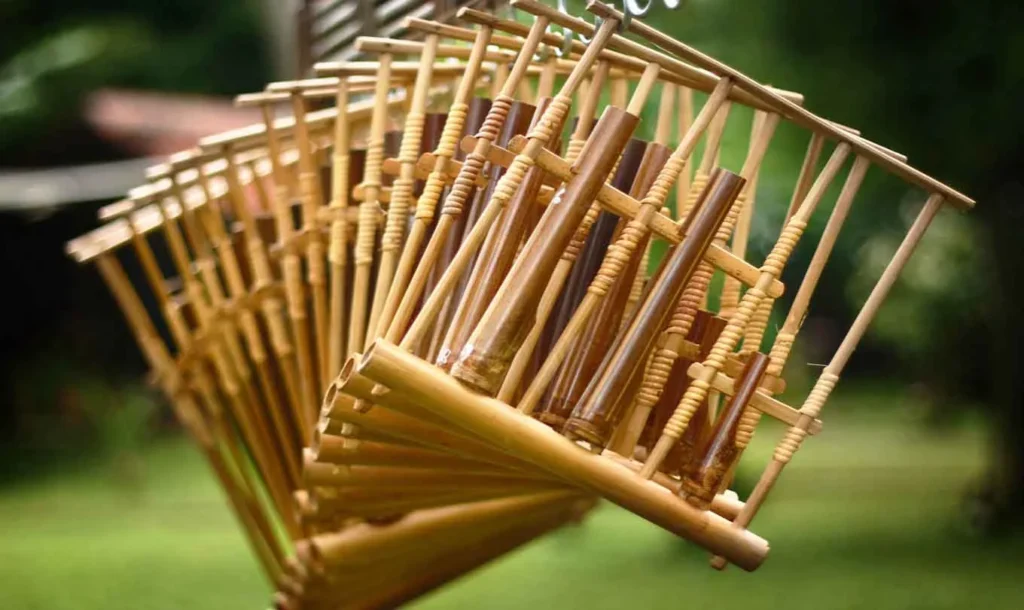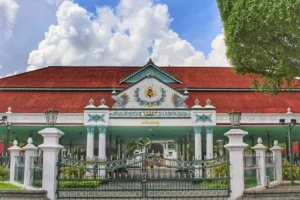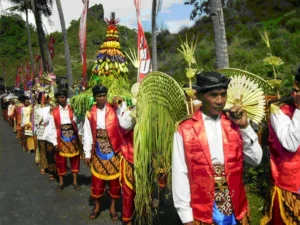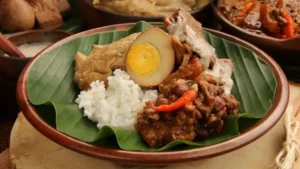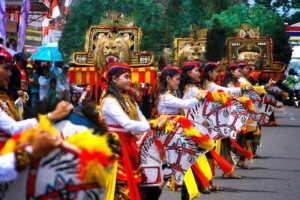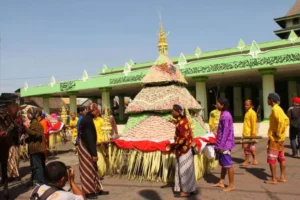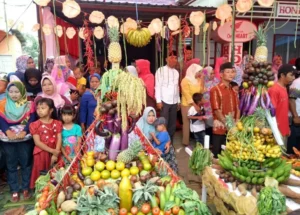Indonesia, with its cultural diversity and rich traditions, holds a vast amount of invaluable treasures in the form of customs and traditions. One of the most fascinating cultural heritages is the richness of Javanese traditions. From small celebrations to grand ceremonies, Javanese customs permeate the daily life of the Javanese people. The beauty and uniqueness of Javanese customs are a particular attraction for tourists who wish to deeply understand and experience the cultural richness of Indonesia.
Every aspect of Javanese life, whether it be in terms of clothing, language, food, or social systems, reflects the values and norms passed down from generation to generation. Through Javanese customs, we can understand the importance of values such as politeness, solidarity, and respect for ancestors in everyday life. For those who wish to explore the richness of Javanese cultural heritage in depth, joining a guided tour led by local Javanese travel agents is a wise choice.
With the assistance of experts in local culture and traditions, this experience will offer a deeper understanding of the uniqueness of Javanese customs. Furthermore, through this tour, tourists can also directly interact with the local population, understand the stories behind each tradition, and even participate in some customary activities. Thus, tourists will not only be observers but also active participants in an authentic cultural experience.
By understanding and appreciating Javanese customs, tourists can feel the true beauty and depth of Indonesian culture. This is an important step in preserving and safeguarding the precious cultural heritage for the Indonesian nation.
7 Javanese Customs Understanding Local Wisdom and Traditions
1.Discovering the Beauty of the Javanese Royal Palace
source : anekatempatwisata.com
The royal palace, as a traditional Javanese palace, is not just a physical building but also a symbol of power, wisdom, and cultural beauty reflected in every detail. Javanese customs are reflected in all aspects of life within the palace, from clothing styles and traditional ceremonies to social etiquette.
Thanks to local guides who are experts in Javanese culture, visitors can gain a deep understanding of life within the palace. During their visit, tourists will be guided to understand the history and philosophy behind each architectural and ornamental element embellishing the palace. From wall decorations depicting Javanese mythology to spatial arrangements following traditional layout principles, every detail holds profound meaning and symbolism.
Moreover, local guides will also take tourists to experience life within the palace directly. They can attend regularly held traditional ceremonies, interact with palace residents, and even try on traditional Javanese clothing for an authentic experience. At every step, the beauty and richness of Javanese customs will be strongly felt. Visitors will realize the importance of preserving this cultural heritage for future generations. More than just a tourist attraction, the palace becomes a window into the deepest spiritual and philosophical richness of Javanese culture.
Thus, through this experience, tourists will not only gain new knowledge about Javanese history and culture but also have an enriching experience in understanding the life values and rich customs in Indonesia. They will become ambassadors promoting the importance of preserving and respecting Javanese customs as an integral part of Indonesia’s diverse and rich cultural identity.
2.Experiencing Javanese Traditional Rituals
source : asliindonesia.net
Traditional Javanese rituals play an important role in the life of their community, not only as a series of formal actions but also as a means of connecting to spirituality and ancestral heritage. From meaningful wedding ceremonies to symbol-laden funeral rituals, each celebration reflects the richness of Javanese customs. Local Javanese travel agents play a key role in providing tourists with an in-depth experience of these rituals.
They are not just physical guides but also experts explaining the meaning and purpose of each step of the ritual. Visitors will be invited to observe, participate, and directly experience every significant moment of the ritual process, allowing them to better understand the local wisdom and values hidden within. In wedding ceremonies, for example, travel agents will explain the symbolism of each action, from greetings to ritual procedures. They will immerse tourists in the significance of camaraderie, fidelity, and commitment expressed through Javanese marriages.
Similarly, in funeral rituals, tourists will understand the concept of life and death from the Javanese perspective, as well as how society honors and celebrates the departure of souls who have left this world. Through this experience, tourists will gain a deeper understanding of Javanese cultural values and how this tradition is continually preserved to this day. They will realize that Javanese customs are not just a series of formal actions but a precious heritage that enriches spirituality and Indonesian cultural identity as a whole.
Thus, following Javanese traditional rituals under the guidance of local travel agents is not just observation or a simple tourist visit but also an opportunity to gain a profound experience in understanding and appreciating the varied and unique cultural richness of Indonesia.
3.Exploring Javanese Traditional Cuisine
source : hot.liputan6.com
Javanese cuisine has its own uniqueness that lies not only in its distinctive flavors but also in the cultural values it contains. Javanese customs are reflected in various aspects of cuisine, from the selection of traditional ingredients to cooking techniques passed down from generation to generation. During a culinary journey in Java, tourists can explore the diversity of interesting traditional dishes, such as gudeg, a typical dish from Yogyakarta made from young jackfruit cooked with coconut milk and spices.
Then there is also soto ayam, a typical Javanese soup dish rich in spices and delicious aromas. With the assistance of experienced local travel agents, tourists can not only taste these delicious dishes but also learn directly from experts. They can actively participate in the process of preparing traditional Javanese dishes, from ingredient preparation to proper cooking techniques.
Furthermore, this culinary experience also offers tourists the opportunity to delve into the stories and meanings behind each dish. Behind every traditional Javanese dish are philosophies and cultural values that contribute to shaping the identity of Javanese society. For example, gudeg is not just a dish but also symbolizes patience and perseverance in a cooking process that takes a long time.
Through this experience, tourists will not only satisfy their palates with authentic flavors but also gain a deeper understanding of the close relationship between food, culture, and the identity of Javanese society. They will realize that Javanese cuisine serves not only to satisfy physical needs but is also an integral part of cultural heritage deserving preservation and respect.
4.Immerse Yourself in Javanese Art and Culture
Source: cintaindonesia.web.id
Javanese arts and culture play an irreplaceable role in enriching and preserving Javanese customs. From wayang kulit to traditional dances, each artistic expression carries within it a rich cultural heritage and a deep history. Local travel agencies play a crucial role in facilitating enriching experiences for tourists eager to explore the beauty of Javanese arts. Through their guides, tourists can witness authentic artistic performances, appreciate every dance movement or wayang scene, and understand the stories as well as the meanings underlying them.
Moreover, by participating in workshops organized by local travel agencies, tourists have the opportunity to directly learn artistic techniques and immerse themselves in the traditional narratives they contain. Thus, this experience is not just entertainment, but also a means of understanding and preserving the rich and diverse Javanese cultural identity. Javanese customs are an integral part of Javanese social life. Every ritual, celebration, and daily activity is imbued with the distinctive culture. Javanese arts and culture are one of the primary means used to express and reinforce the values of traditional customs.
In every movement of traditional dance, there are symbols that describe the Javanese philosophy of life, such as harmony between humans and nature, as well as the values of wisdom passed down from generation to generation. Not only as mere entertainment, Javanese arts also play a crucial role in maintaining the continuity and sustainability of Javanese culture.
Thanks to spectators who continue to appreciate and learn Javanese arts, the values and traditions contained within these arts remain alive and evolving. Javanese customs reflected in arts and culture are part of the identity that reinforces the self-esteem of Javanese people, and they also attract tourists eager to experience authentic cultural experiences.
By visiting Javanese artistic and cultural sites guided by local travel agencies, tourists can do much more than just watch performances or admire artworks. They also have the opportunity to interact directly with local artists, understand the creative process behind each work, and delve into the philosophical meaning hidden behind each scene. This not only strengthens the appreciation of Javanese arts but also the overall understanding of Javanese customs. Thus, the presence of Javanese arts and culture becomes a means of enriching the cultural tourism experience and strengthening the links between culture and tourism.
5.Attend Traditional Javanese Ceremonies
Source: udfauzi.com
Traditional Javanese ceremonies are an integral part of Javanese life. From religious ceremonies to rituals related to the life cycle, each ceremony has deep significance and symbolism. In the context of Javanese customs, ceremonies are not just a series of actions, but they also showcase the cultural richness and values passed down from generation to generation. With the help of local travel agents, tourists can directly attend various traditional Javanese ceremonies that are still preserved today.
They will be invited to understand the meaning behind each action and symbol in these ceremonies, while admiring the beauty and cultural richness that manifest in every detail of the ceremony. By watching these ceremonies, tourists will be amazed by spectacular views, such as magnificent traditional costumes, graceful traditional dances, and enchanting gamelan music. Javanese customs also reflect the life philosophy of their society, such as values of solidarity, respect for ancestors, and balance between humans and nature.
By attending traditional Javanese ceremonies, tourists will not only have the opportunity to admire the visual beauty but also to understand the meanings contained within them. Thus, Javanese customs offer a deep and memorable cultural experience for tourists visiting Java.
6.Explore the Center of Traditional Javanese Handicrafts
Source: cintaindonesia.web.id
Java is famous for its artistic richness and crafts closely related to Javanese customs. Crafts such as batik, wood carving, and bamboo weaving are not just products but also an integral part of the Javanese culture rich in traditions. Through trips with local travel agents, tourists not only have the opportunity to visit traditional Javanese handicraft centers but can also understand the cultural values contained within them. Tourists will directly meet artisans who preserve the Javanese cultural heritage through their skills.
By interacting with artisans, they will discover how Javanese customs influence the artisanal manufacturing process, from pattern selection to manufacturing techniques passed down from generation to generation. Thus, tourists not only gain hands-on experience by trying to create their own artwork but also deepen the cultural values contained in each artistic touch. More than just a commercial product, Javanese handicrafts are a symbol of pride and cultural identity for their community.
By preserving this cultural heritage, artisans not only honor Javanese customs but also contribute to enriching and preserving the cultural richness that is an integral part of Javanese identity. Therefore, traveling to observe and experience Javanese handicrafts not only offers the opportunity to create but also serves as a gateway to understanding and appreciating more deeply the rich and profound cultural values of Javanese customs.
7.Participate in Local Community Activities
Source: bolulembang.co.id
Local communities in Java play a central role in preserving and protecting local traditions and wisdom closely related to Javanese customs. Collaboration with local travel agents is a bridge for tourists to have a direct experience in community life. By participating in activities such as gotong royong (community mutual assistance), tourists not only contribute to maintaining environmental cleanliness but also feel the warmth and sense of community that are important values in Javanese culture.
Moreover, tourists can also appreciate local artistic performances that are an integral part of community life. Through traditional performances such as dance, wayang kulit (shadow puppetry), or gamelan music, tourists can better understand the cultural values passed down from generation to generation in Javanese society. Direct interaction with the local population also opens a window into daily life and cultural values firmly preserved within Javanese society. Cultural discussions with locals provide tourists with the opportunity to exchange ideas and deepen their understanding of Javanese customs and their influence in daily life.
Thus, by participating in local community activities, tourists are not just observers but also engaged actors in the preservation and development of Javanese culture. This also strengthens the ties between tourists and the local community, enriching the tourist experience by deepening the rich and profound cultural values of Javanese customs.

